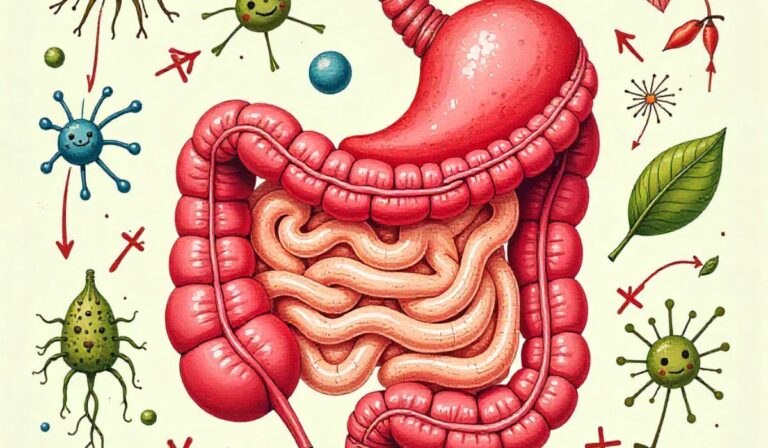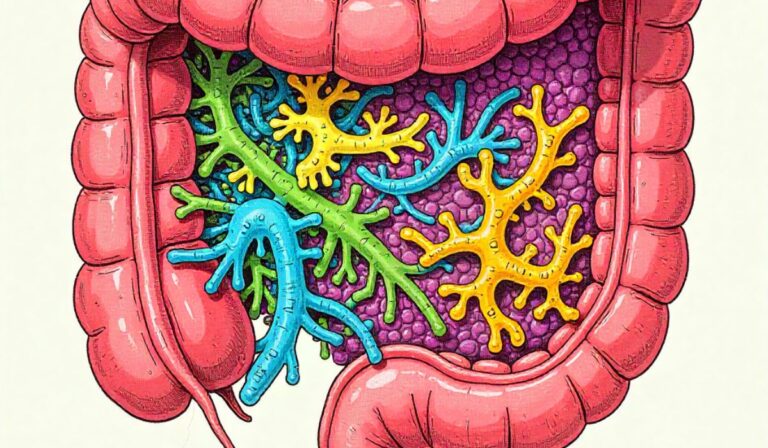Gut Health Tips for Runners, Athletes & Endurance: Fueling Performance
Key Takeaways
- Learn how your gut microbiome influences athletic performance and recovery.
- Discover how dietary choices can impact gut health and endurance capabilities.
- Find out how to incorporate probiotics and prebiotics into your nutrition plan.
- Understand the importance of stress management in maintaining a healthy gut.
- Explore effective strategies for preventing and managing common digestive issues.
- Gain insights on the role of sleep in supporting gut health and maximizing performance.
Ever feel that mid-race stomach cramp threaten to derail your efforts? Or maybe you’ve experienced frequent bloating after a long run?
Many runners and athletes often overlook the significant impact their gut health has on their performance.
This post will give you practical gut health tips to help improve your endurance and overall athletic capabilities, helping you feel your best.
You’ll gain valuable knowledge on how to optimize your diet, manage stress, and choose the right supplements for peak performance.
Get ready to discover strategies for enhancing your training and racing experience, leading to improved endurance and reduced discomfort.
![Gut Health Tips for Runners, Athletes & Endurance Fueling Performance[1]](https://mycleanseplan.com/wp-content/uploads/2025/11/Gut_Health_Tips_for_Runners_Athletes__Endurance__Fueling_Performance1.jpg)
The Vital Link Between Your Gut and Athletic Performance
Your gut, which includes the intestines and all the microorganisms within them (collectively known as the gut microbiome), plays a much larger role than simply digesting food.
It’s a key player in nutrient absorption, immune function, and overall well-being. For athletes, the state of their gut can drastically affect their performance, recovery, and susceptibility to illness.
A healthy gut ensures efficient absorption of nutrients needed for energy, muscle repair, and hydration.
Additionally, a balanced gut microbiome supports a strong immune system, which is crucial for athletes who often push their bodies to the limit.
The interplay is undeniable, so taking care of your gut is a must if you’re serious about your training.
The Gut Microbiome Explained
The gut microbiome is a complex ecosystem of trillions of bacteria, fungi, viruses, and other microorganisms that live in your intestines.
Think of it as a rainforest in your body, with various species interacting with each other and affecting your health in many ways.
A balanced gut microbiome is one where there’s a healthy diversity of beneficial bacteria that keeps harmful bacteria in check.
The composition of your gut microbiome is shaped by several factors, including your diet, lifestyle, genetics, and environment.
These microorganisms are very important because they help with digestion, nutrient absorption, vitamin production, and keeping your immune system working correctly.
- Diversity is Key: A wide range of bacterial species indicates a resilient gut.
- Digestion Helpers: Microbes help break down complex carbohydrates that your body can’t digest on its own.
- Vitamin Factories: They produce essential vitamins like vitamin K and some B vitamins.
- Immune Boosters: They assist in protecting against infections by competing with harmful bacteria.
- Inflammation Control: A balanced microbiome helps reduce chronic inflammation.
The gut microbiome is constantly interacting with your body. When you eat, the microbes break down the food and provide nutrients.
They also help keep the bad bacteria from getting out of control. When the balance is off, you may experience digestive issues, weakened immunity, and a higher chance of inflammation.
By learning how to support a healthy microbiome, you can enjoy better health and enhanced performance.
How the Gut Impacts Athletic Performance
For runners and endurance athletes, a healthy gut is really a performance enhancer. The gut’s efficiency in absorbing nutrients directly impacts your energy levels, muscle recovery, and overall endurance.
Imagine trying to run a marathon without properly fueling your body; the same applies to your gut.
When the gut is in top shape, it can efficiently extract nutrients from the food you eat, providing your muscles with the fuel and support needed for intense physical activity.
Conversely, a distressed gut can lead to several problems that can reduce your athletic performance, like nutrient deficiencies, inflammation, and fatigue.
Here’s how a balanced gut supports athletic achievements:
- Enhanced Nutrient Absorption: A healthy gut lining allows for efficient absorption of nutrients like iron, protein, and carbohydrates, which are essential for muscle growth, energy, and recovery.
- Reduced Inflammation: A balanced microbiome helps to manage inflammation, which can reduce muscle soreness and speed up recovery.
- Improved Energy Levels: Efficient nutrient absorption and the production of energy-boosting compounds by gut bacteria can lead to increased energy levels during training and competition.
- Stronger Immunity: A healthy gut supports a strong immune system, reducing the risk of illness and allowing athletes to maintain consistent training schedules.
- Mental Clarity: The gut-brain axis is a two-way street. A healthy gut can lead to clearer thinking and better focus.
A study published in the “Journal of the International Society of Sports Nutrition” found that athletes with diverse gut microbiomes showed better endurance performance and lower inflammation levels compared to those with less diverse microbiomes. (Journal of the International Society of Sports Nutrition, 2017)
Common Gut Issues in Athletes
Athletes, especially those involved in endurance sports, are more prone to gut issues due to factors like increased blood flow diversion to working muscles, altered gut motility, and the physical stress of intense exercise.
These issues can range from mild discomfort to more severe problems that can really mess up your training and racing.
Runners may experience issues such as stomach cramps, nausea, diarrhea, and bloating, particularly during long runs or races.
A high-sugar, high-fat diet may exacerbate these issues, as can dehydration and inadequate fueling strategies.
Understanding the common gut problems will assist you in taking steps to help prevent and manage them.
- Runner’s Gut: This encompasses a range of digestive symptoms that athletes may experience, from stomach cramps to diarrhea, particularly during and after exercise.
- Increased Intestinal Permeability: Intense exercise can cause damage to the gut lining, making it more permeable, allowing unwanted substances to enter the bloodstream.
- Delayed Gastric Emptying: This can lead to bloating, nausea, and discomfort, especially during high-intensity training or competitions.
- Malabsorption: Gut dysfunction can lead to reduced nutrient absorption, potentially causing deficiencies in essential vitamins and minerals.
- Inflammation: The physical stress of training can cause gut inflammation, which can affect performance and recovery.
A recent study showed that over 50% of marathon runners experienced gastrointestinal distress during or after a race.
Proper hydration, fueling strategies, and pre-race nutrition are vital in mitigating the issues. (American Journal of Sports Medicine, 2021)
Fueling Your Body: Dietary Strategies for a Healthy Gut
What you eat plays a huge part in gut health. The right foods can feed the beneficial bacteria in your gut, while others can cause irritation and disrupt the balance.
By focusing on a diet that is rich in whole foods, fiber, and prebiotics and probiotics, you can create a happy gut that supports peak performance.
This section will guide you through the key dietary strategies to nourish your gut and enhance your athletic capabilities.
The Importance of Fiber and Whole Foods
Fiber is very important for gut health. It acts as a prebiotic, which means it feeds the good bacteria in your gut.
Fiber-rich foods like fruits, vegetables, and whole grains help your gut bacteria thrive and keeps everything moving smoothly. Whole foods are those that haven’t been processed.
They have all the nutrients your body needs and are gentle on the digestive system. A diet that is rich in these foods provides your body with essential vitamins, minerals, and antioxidants, while also reducing inflammation.
- Prebiotic Powerhouses: Foods like garlic, onions, bananas, and oats are packed with prebiotics, feeding beneficial gut bacteria.
- Fiber’s Role: Soluble fiber helps to slow digestion and promotes a feeling of fullness. Insoluble fiber adds bulk to your stool, helping with regularity.
- Choosing Whole Grains: Swap processed grains for options like quinoa, brown rice, and whole-wheat bread.
- Variety is Key: A varied diet that includes various fruits, vegetables, and whole grains ensures a diverse range of nutrients and prebiotics.
- Hydration: Drink plenty of water to help fiber move through your digestive system.
Studies have shown that increased fiber intake can improve gut bacteria diversity and reduce inflammation.
In the “American Journal of Clinical Nutrition,” it was found that increasing fiber intake significantly correlated with improvements in gut health. (American Journal of Clinical Nutrition, 2018)
Probiotics and Prebiotics: The Dynamic Duo
Probiotics and prebiotics work together to support a healthy gut. Probiotics are live, beneficial bacteria found in certain foods and supplements.
They increase the number of good bacteria in your gut. Prebiotics are types of fiber that your gut bacteria feed on.
Think of them as food for your probiotics. Incorporating both into your diet can lead to a more balanced gut microbiome, better digestion, and an improved immune system.
- Probiotic-Rich Foods: Include foods like yogurt (with live and active cultures), kefir, sauerkraut, kimchi, and kombucha in your diet.
- Prebiotic Sources: Eat onions, garlic, bananas, oats, apples, and flaxseeds to feed your good gut bacteria.
- Supplementing with Probiotics: Consider a probiotic supplement, especially during periods of high training stress or after antibiotic use, but consult with a healthcare professional before starting.
- Timing Matters: Take probiotics at a time when your stomach acid is lower, like with a meal.
- Gradual Introduction: Introduce probiotics and prebiotics slowly to avoid temporary digestive discomfort.
A study published in “Sports Medicine” showed that probiotic supplementation can improve gut health, reduce inflammation, and enhance athletic performance. (Sports Medicine, 2015)
Foods to Limit for Optimal Gut Health
Some foods can be hard on the gut and should be limited. Processed foods, high in sugar, fat, and artificial ingredients, can feed harmful bacteria and cause inflammation.
Dairy, especially for those who are lactose intolerant, can cause bloating and digestive distress. High-fat meals can slow down digestion and increase the risk of gut issues during exercise.
By reducing your intake of these foods, you can lessen the load on your digestive system and support a healthier gut environment.
- Processed Foods: Reduce your intake of processed foods, such as fast food, packaged snacks, and sugary drinks.
- Excessive Sugar: Limit foods and drinks high in added sugar, as they can feed harmful bacteria in your gut.
- High-Fat Foods: Be mindful of your intake of high-fat foods, especially before exercise, as they can slow down digestion.
- Artificial Sweeteners: Avoid artificial sweeteners as they can disrupt your gut bacteria balance.
- Alcohol: Drink in moderation, as excessive alcohol consumption can irritate your gut lining.
Research suggests that a diet high in processed foods and saturated fats is associated with reduced gut diversity and increased gut inflammation. (The American Journal of Clinical Nutrition, 2019)
Stress Management and the Gut-Brain Connection
The relationship between your gut and brain is a two-way street. The gut-brain axis is the communication system between your gut and your brain, and it influences digestion, immune function, and even mental health.
Stress can disrupt this communication, causing both digestive issues and mental distress. For athletes, the physical and mental stress of training and competition can significantly impact gut health.
Managing stress is essential for keeping your gut balanced, which will then improve performance and overall well-being. This section will explore the vital connection between stress management and gut health.
How Stress Affects Your Gut
Stress triggers your body’s “fight or flight” response, which releases hormones like cortisol and adrenaline.
These hormones can disrupt the delicate balance of the gut microbiome, slow down digestion, and increase gut permeability.
When your gut lining becomes more permeable, harmful substances can enter the bloodstream and trigger inflammation.
Chronic stress can worsen these effects, potentially leading to digestive issues like irritable bowel syndrome (IBS), bloating, and changes in bowel habits.
These issues can have a big effect on athletic performance, leading to discomfort, reduced nutrient absorption, and decreased energy.
- Altered Gut Motility: Stress can speed up or slow down the movement of food through your digestive tract, leading to diarrhea or constipation.
- Increased Gut Permeability: Stress can damage the gut lining, making it more permeable, allowing substances to leak into the bloodstream.
- Changes in Gut Microbiome: Stress can reduce the diversity of beneficial bacteria in your gut and promote the growth of harmful bacteria.
- Inflammation: Stress can trigger inflammation throughout the body, including the gut.
- Reduced Blood Flow: Stress diverts blood flow away from the digestive system, which can impair digestion.
Studies have shown that chronic stress is associated with reduced gut microbiome diversity and increased gut inflammation. (Psychosomatic Medicine, 2017)
Effective Stress-Reducing Strategies
To support your gut health and improve performance, implementing effective stress-reducing strategies is a must. These strategies will help keep your mind and body in balance.
This helps maintain a healthy gut microbiome and reduce the likelihood of gut-related problems. Things such as mindfulness, deep breathing exercises, and getting enough sleep are all beneficial.
Making time for relaxing activities and maintaining a healthy work-life balance is also helpful. By incorporating these strategies into your daily routine, you can greatly improve your gut health and experience better athletic results.
- Mindfulness and Meditation: Daily meditation can help lower stress hormones and promote relaxation.
- Deep Breathing Exercises: Practice deep breathing to activate the parasympathetic nervous system, which promotes relaxation.
- Regular Exercise: Exercise helps to reduce stress and improve mental well-being.
- Adequate Sleep: Aim for 7-9 hours of quality sleep per night. Sleep is essential for stress reduction and gut health.
- Social Connections: Spend time with loved ones and engage in social activities to reduce feelings of isolation and stress.
A recent study found that mindfulness-based stress reduction (MBSR) programs can significantly reduce stress and improve gut health markers. (Journal of Consulting and Clinical Psychology, 2020)
The Role of Sleep in Gut Health
Sleep is a vital ingredient for overall health, and its importance for gut health should not be underestimated. When you sleep, your body repairs and regenerates, including in your digestive system.
Sleep deprivation can disrupt the gut microbiome balance, increase gut permeability, and worsen inflammation.
Athletes, in particular, need adequate sleep to support their recovery and performance. Getting sufficient sleep helps regulate hormones, reduce stress, and allow the gut to function efficiently.
Prioritizing quality sleep is a great investment in both your gut health and your athletic achievements.
- Gut Microbiome Regulation: Sleep deprivation can disrupt the balance of gut bacteria, increasing the presence of harmful bacteria.
- Reduced Inflammation: Adequate sleep helps to reduce overall inflammation in the body.
- Hormonal Balance: Sleep helps regulate hormones, including those involved in digestion and appetite.
- Improved Gut Motility: Sleep supports proper digestive function, promoting healthy bowel movements.
- Enhanced Immune Function: Quality sleep strengthens your immune system, making your body more resilient to stressors.
Research indicates that sleep deprivation is associated with reduced gut microbiome diversity and increased gut inflammation. (Sleep Medicine Reviews, 2019)
Supplements and Strategies for Optimal Gut Health
While diet and lifestyle are fundamental to gut health, certain supplements can provide additional support and promote optimal digestive function, especially for athletes.
This section will explore a number of targeted supplements and strategies that can help you create and maintain a healthy gut environment and to manage any digestive problems. You can optimize your performance and overall well-being by incorporating the right supplements and approaches.
Probiotics and Prebiotics: Choosing the Right Ones
As mentioned before, probiotics and prebiotics are very important for gut health. Probiotics add beneficial bacteria to your gut, and prebiotics feed these bacteria, allowing them to thrive.
The choice of probiotic strains and prebiotic types matters; different strains have different effects, and certain prebiotics are better for some people than others. For athletes, focusing on strains known to support gut health, reduce inflammation, and boost immune function is best.
When choosing a probiotic, consider factors such as the strain, the number of colony-forming units (CFUs), and the supplement’s shelf life.
Similarly, selecting prebiotic fibers that are well-tolerated and can support the growth of the beneficial bacteria in your gut is important.
- Strain Specificity: Look for probiotics with strains such as Lactobacillus and Bifidobacterium, which have been studied for their positive effects on gut health.
- CFU Count: Choose supplements with a high CFU count, typically ranging from 1 billion to 100 billion per serving.
- Prebiotic Types: Consider prebiotics like inulin, FOS (fructooligosaccharides), and GOS (galactooligosaccharides) to feed the good bacteria in your gut.
- Consultation: Talk to a healthcare provider to find which probiotics and prebiotics are right for you and what your body needs.
- Quality Assurance: Make sure supplements are from reputable brands with third-party testing to confirm their purity and potency.
Studies have shown that probiotics containing specific strains can reduce gut permeability and improve athletic performance. (Gut, 2014)
Other Helpful Supplements
Several other supplements can help to support gut health and reduce inflammation. Digestive enzymes can help improve digestion, especially when eating meals rich in protein, fats, or complex carbohydrates.
Glutamine, an amino acid, can help support the gut lining and reduce permeability. Omega-3 fatty acids, found in fish oil, have anti-inflammatory properties that can soothe the gut and protect against damage.
However, it’s very important to talk to a healthcare professional before starting any new supplement regimen to make sure it is safe and suited for your individual needs.
- Digestive Enzymes: Supplementing with digestive enzymes can help the body break down food more efficiently, reducing digestive distress.
- L-Glutamine: This amino acid can support the health of your gut lining and help to repair any damage.
- Omega-3 Fatty Acids: Fish oil supplements can reduce inflammation and support gut health.
- Curcumin: Curcumin, from turmeric, has strong anti-inflammatory properties and can benefit gut health.
- Hydration Supplements: Consider electrolyte supplements to maintain hydration, which is essential for healthy gut function.
Research indicates that omega-3 fatty acids can reduce gut inflammation and improve gut health markers. (The American Journal of Clinical Nutrition, 2013)
Strategies for Managing Digestive Issues
Even with a good diet and supplementation, some athletes still experience digestive problems. A practical way to resolve these issues is to develop strategies to prevent and manage them.
Making adjustments to your pre-exercise nutrition, staying hydrated, and learning your body's individual tolerances are the basis of these strategies.
Keeping a food journal can help you identify foods or other things that may be triggering your symptoms. When these strategies are combined, you can improve gut comfort and performance.
- Fueling Strategies: Experiment with pre-exercise meals to see what works best for you. For some, a low-fiber, low-fat meal may be optimal. Others may be fine with whole grains. Test different options during training runs to see how your body reacts.
- Hydration: Drink plenty of water before, during, and after exercise. Electrolyte drinks can help replenish lost minerals and prevent dehydration-related issues.
- Food Journal: Keep a journal to record your meals and any gut symptoms you experience. This can help you identify foods that may be triggering your symptoms.
- Gradual Changes: Introduce new foods and supplements gradually to allow your gut to adapt. This can help to prevent digestive upset.
- Professional Guidance: Consult with a sports dietitian or healthcare provider if you continue to experience gut issues. They can offer personalized advice.
A recent study found that personalized nutrition plans, tailored to an athlete’s unique needs and tolerances, led to better gut health and improved performance. (Nutrition Reviews, 2022)
FAQ Of Gut Health Tips for Runners, Athletes & Endurance
Can exercise hurt my gut health?
Yes, intense exercise can sometimes cause temporary damage to your gut lining, leading to increased permeability, or “leaky gut,” and potential digestive issues.
What is the best way to determine if I have a gut issue?
Keeping a food journal, tracking your symptoms, and talking with a healthcare professional can help you discover if you have a gut issue.
What’s the role of probiotics for runners and endurance athletes?
Probiotics can help balance your gut bacteria, reduce inflammation, and enhance nutrient absorption, which can improve your performance and recovery.
Are there foods I should avoid to support my gut health?
Yes, it is best to limit processed foods, excessive sugar, high-fat foods, artificial sweeteners, and alcohol to help your gut and overall health.
How much sleep do I need to support my gut health?
Aim for 7 to 9 hours of quality sleep per night. Sleep is very important for gut health and overall well-being.
Final Thoughts
Taking care of your gut health is a key step towards improving your performance, endurance, and overall well-being as a runner or athlete.
By understanding the connection between your gut and your athletic abilities, you can make informed choices to fuel your body effectively.
Focusing on a diet rich in whole foods, fiber, and prebiotics while limiting foods that can trigger issues will lay a strong foundation for a healthy gut.
When this is coupled with stress management techniques, sufficient sleep, and, when appropriate, targeted supplements, you can create a gut environment that supports peak performance.
Explore these gut health tips today by gradually incorporating them into your daily and training routine. Listen to your body and make adjustments as needed.
Celebrate small improvements and remember that consistency is key. Your gut health is a continuous process, so keep learning, be patient with yourself, and embrace the positive changes that come with a healthy gut.
You’ll not only enhance your athletic achievements but also support your long-term health and well-being. Start fueling your success from the inside out and feel the difference!



![How to Interpret Your Gut Microbiome Test Report[1]](https://mycleanseplan.com/wp-content/uploads/2025/10/How_to_Interpret_Your_Gut_Microbiome_Test_Report1-768x448.jpg)

![How Ultra processed Foods Disrupt Gut Microbiota and Impact Health[1]](https://mycleanseplan.com/wp-content/uploads/2025/10/How_Ultra-processed_Foods_Disrupt_Gut_Microbiota_and_Impact_Health1-768x448.jpg)
